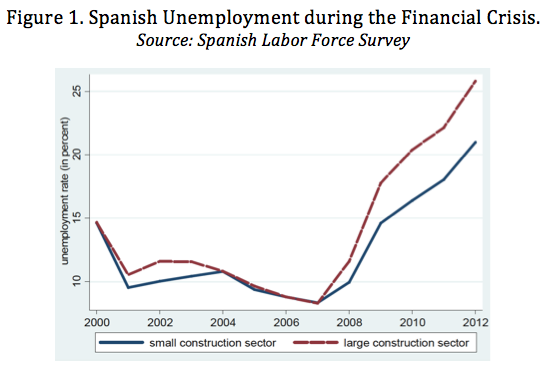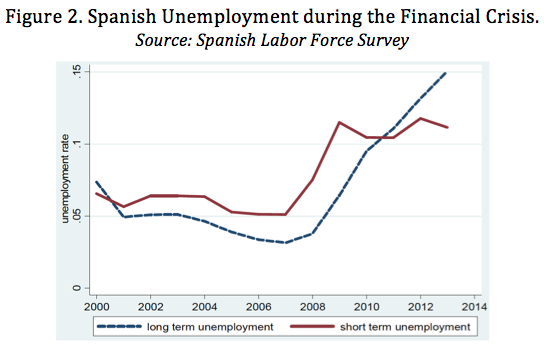In their BSE Working Paper (No. 838), Feeling Useless: The Effect of Unemployment on Mental Health in the Great Recession, Lídia Farré, Francesco Fasani and Hannes Mueller explore the connection between unemployment and mental health status. Results of their study suggest that an increase in unemployment rate caused by the collapse of the construction sector in the economic crisis raised mental disorders drastically.
Overview and related research
In this paper, the authors investigate the relationship between unemployment and mental health in the context of the Spanish economic crisis. There are several channels through which a relationship between unemployment and (mental) health can arise: (i) sickness is likely to lead to unemployment; (ii) poor health produces longer unemployment spells; (iii) unemployment can cause deterioration in health. What is needed in this context is a shock that leads to unemployment but is uncorrelated with changes in health.
The authors use job destruction in the construction sector in the years following 2007 as a source of exogenous variation for individual unemployment. This technique allows them to establish a causal link between unemployment and mental health status.
The Spanish Economic Crisis of 2007
The economic crisis of 2007 had severe consequences on the Spanish labor market, as the unemployment rate escalated from around 8% in 2007 to 25% in 2011. The shock to employment was highly concentrated on the construction sector. Over 60% of all jobs in construction were lost between 2008 and 2013. In some provinces this was a substantial part of all available jobs. Figure 1 shows the evolution of the unemployment rate before and during the crisis. The skyrocketing of unemployment rates after the crisis hit is visibly more severe for Spanish regions with large levels of construction.

Simultaneously, the exceptionally low re-entry probability after job loss, which occurred as a consequence of the crisis, is depicted in Figure 2. From the changes in long term unemployment we can conclude that the majority of the individuals who lost their jobs in 2008 and 2009 were not able to re-enter the labor market later. Again, this pattern was particularly pronounced for individuals who had worked in construction before.

In summary, the collapse of the construction sector led to a change in employment status and extremely long unemployment spells for exogenous reasons which were not driven by individual characteristics. It should therefore be possible to study the effect of unemployment of mental health in this context.
Data
Farré et al (2015) use data from the Spanish National Health Survey (ENS), particularly focusing on the two last waves of the survey, 2006 (just before the crisis) and 2011. This survey reports self-assessed general and mental health status and diagnosis on illnesses, such as chronic back pain, chronic headache, heart attack and stroke. Observations from individuals below 17 and above 64 years old are excluded, as well as the inactive population.
Results
The exogenous shock in the construction sector is used as an instrument for unemployment in the estimation of the effect of unemployment on mental health outcomes. This method hinges on the size of the construction sector in a particular cell (for example: male/under 40 years old/in Barcelona) in 2006 being a strong predictor of the subsequent unemployment rate increase when the financial crisis hit. The results obtained from the comparison of health status in the two latest waves of the ENS reveal that a 10 percentage point increase in unemployment driven by this exogenous shock increased mental disorders by around 3 percentage points. These effects are robust to using a finer age group distinction, to including inactive population and to altering the instrument used in the estimation. These findings are corroborated by detailed mental health questionnaires (GHQ 12) included in the ENS which show a general worsening on several dimensions. Individuals reported feeling under strain and that they did not feel they were playing a useful part in things. They were more likely to report that they were unable to concentrate or to overcome their difficulties. However, the authors find no or only weak evidence of a deterioration of health more generally.
Conclusions
This study provides evidence for a decline in mental health in the aftermath of the economic recession in Spain. The decline is identified from a group which is caught in long-term unemployment since the collapse of the Spanish construction sector. This implies that individuals in this group were caught in unemployment for reasons beyond their own control. Mental health in this group seems to have deteriorated dramatically. Individuals reported feeling under strain and that they did not feel they were playing a useful part in things. They were more likely to report that they were unable to concentrate or to overcome their difficulties. These results hint towards an incapacitating effect of mental disorder would pose a liability for the recovery in the Spanish labor market.
photo credit: pulpolux on Flickr



